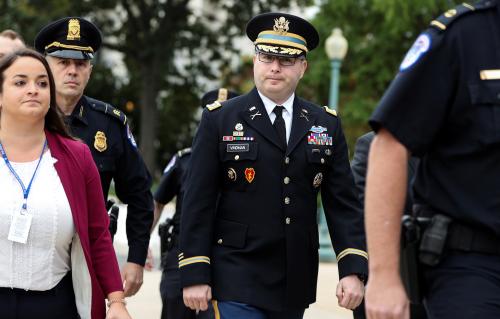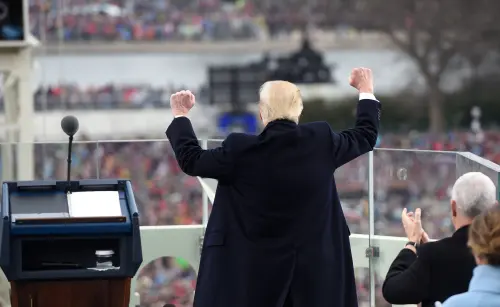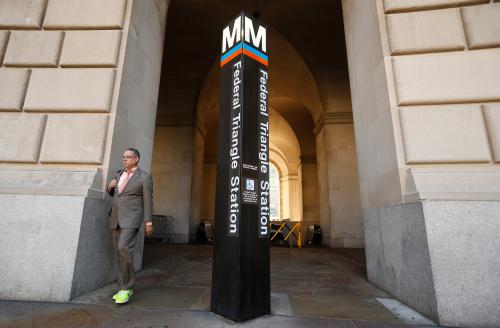Today’s testimony in the House Intelligence Committee shows the importance and integrity of the civil service, or “the permanent government.” Since the beginning of his term, the U.S. bureaucracy has served as a punching bag for President Trump. As his term wore on, Trump promised that a centerpiece of his legacy would be “the destruction of the deep state.”
But his animus towards the so-called deep state is seriously misguided. The permanent government serves across administrations and works diligently to carry out the mission of their agencies in compliance with the laws put forth by Congress. Most civil servants have political leanings that they leave at home regardless of the party of the sitting president. Like in any large organization, there are bureaucrats who behave badly, break the rules, act unethically, or let politics inform their views. However, the government has safeguards to hold those bureaucrats accountable. Laws like the Hatch Act and internal, administrative processes deal with bad acts such as insubordination or political activity.
Regardless of what you believe about the permanent government, what is its alternative? It is an executive branch staffed entirely via patronage. In a patronage system, the bulk of the civilian executive branch staff is hand-selected by the president—a system in which each employee of the government owes their allegiance to the president. In its first century of its existence, the U.S. largely operated in this manner. The government was not predominantly staffed by qualified professionals, but by those to whom the president owed political favors. Under that system—one distanced from career civil servants and that at times calls on them to fill certain policy-focused appointments—the government workforce would have far fewer Bill Taylors, George Kents, Fiona Hills, and Alexander Vindmans. Instead, the bureaucracy would look more like the White House political staff, packed with Mick Mulvaneys, Kellyanne Conways, and Stephen Millers.
However, the president, the White House, and congressional Republicans have woven a conspiracy theory about a deep-state, coordinated, liberal campaign to take down the Republican president. They argue that the bureaucracy is full of Democrats who work simply to undermine the president. Defenders of the president argue that a deep-state liberal conspiracy is the only explanation for the current environment we find this country in—not improper presidential behavior.
But if the U.S. civil service is a stockpile of liberal Democrats bursting at the seams to take down a Republican president, why act now? Why did the bureaucracy not rise up with a coordinated conspiracy to take down President George W. Bush? President Bush was a polarizing president who the political left despised. There were several periods of President Bush’s second term in which he was far less popular than President Trump has been over the past year. He cut taxes, sent America to two wars, campaigned on the backs of anti-gay marriage ballot initiatives, and was committed to the right to life. He incensed liberals in America and would have been an easy target for a large liberal conspiracy to try to take him down. And in fact, the final two years of the Bush administration gave America a Democratic-controlled House of Representatives with Nancy Pelosi as Speaker—the same situation we find ourselves in today. Instead, the civil service did not.
Why? Because the civil service is not an apparatus of some deep-state, liberal force. It is a group of individuals dedicated to their country that sounds a warning siren when they see that country and its principles under threat. The fact that the deep state has not regularly risen up to undermine conservative, Republican presidents belies the deep-state theory. In fact, for civil servants, it is not the norm to contradict the president. The fact that so many career bureaucrats have come forth to testify against the president is an indication that the actions in question are so breathtakingly unprecedented that these public servants were moved to report it to proper authorities and testify about it publicly. That reaction to the president’s behavior reflects not a personal animus toward Mr. Trump but rather an oath and allegiance to country and to the Constitution.
However, if the president and his defenders cast aside the entire American bureaucracy and claim that any concerns or criticisms of President Trump must be a liberal, deep-state conspiracy, it creates a larger problem. Those claims about the blanket guilt of the permanent government promote and institutionalize the idea of the infallibility of President Trump—a dangerous trope in a democracy.
While the president and his supporters may well embrace the idea of 100,000 Stephen Millers working in the Department of Homeland Security, they could be replaced by Bernie Sanders’s or Elizabeth Warren’s loudest cheerleaders after another election. Even if you don’t think the president’s behaviors were improper, even if you think they were improper but don’t rise to the level of impeachment, one can make those arguments without attacking the civil service. The nonsensical, heavy-handed attacks on the bureaucracy are unfounded, especially when they target anyone questioning the president’s actions as “witnesses deemed suitable for television by the Democrats…” who would deliver “a televised theatrical performance staged by Democrats,” as Intelligence Committee Ranking Member Devin Nunes (R-CA) described at the start of the hearing. Nunes went on to “congratulate [Ambassador Taylor and Mr. Kent] for passing the Democrats’ star chamber auditions held for the last weeks in the basement of the Capitol.”
Nunes, sitting before two career civil servants, one of whom is a veteran, finally said “I’ll conclude by noting the immense damage the politicized bureaucracy has done to Americans’ faith in us.” First, the Ranking Member has no grasp of what a politicized bureaucracy looks like because Congress hasn’t dealt with one in over a century. Second, Congress didn’t need any help from the bureaucracy in losing faith among the public. Finally, the men and women who will testify before the Intelligence Committee over the coming weeks will be attacked for being political hacks when in reality they look a lot like most of the permanent government: well-qualified, dedicated public servants who swore allegiance to the Constitution and not to a president.
The Brookings Institution is committed to quality, independence, and impact.
We are supported by a diverse array of funders. In line with our values and policies, each Brookings publication represents the sole views of its author(s).








Commentary
The US civil service: Protectors of the republic
November 13, 2019